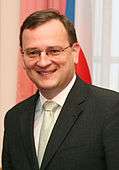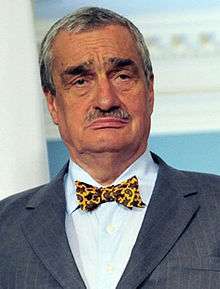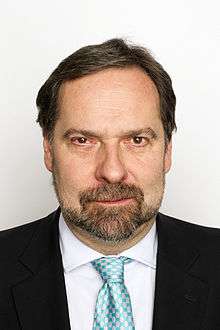Czech legislative election, 2010
| | |||||||||||||||||||||||||||||||||||||||||||||||||||||||||||||||||||||||||||||||||||||
| |||||||||||||||||||||||||||||||||||||||||||||||||||||||||||||||||||||||||||||||||||||
| |||||||||||||||||||||||||||||||||||||||||||||||||||||||||||||||||||||||||||||||||||||
| |||||||||||||||||||||||||||||||||||||||||||||||||||||||||||||||||||||||||||||||||||||
A legislative election in the Czech Republic took place on 28–29 May 2010.[1] The election had been expected to take place some time before the end of 2009 (originally set for 9–10 October 2009, see below) to elect the members of the Chamber of Deputies of the Czech Republic.[2] Before the election, the country had been governed by a caretaker administration.[3]
The election saw a loss of support for the Social Democratic Party (ČSSD), although they still received the highest number of votes.[4] The conservative Civic Democratic Party (ODS) and TOP 09 followed in second and third, while the Communist Party finished fourth. Social Democrat leader Jiří Paroubek resigned after the election, conceding that a conservative coalition government appeared likely, with the rise of two new right-wing parties—TOP 09 and Public Affairs. In June, centre-right coalition of Civic Democratic Party, TOP 09, and Public Affairs was formed, with Petr Nečas becoming the prime minister.
Background
Incumbent PM Mirek Topolánek had lost a no-confidence vote on 24 March 2009. After four failed earlier attempts, the opposition Social Democrats succeeded in leading the lower house of the Czech parliament to a no confidence vote in Topolánek's government. The measure passed with 101 votes to 96, largely due to several members of Topolánek's own party voting with the opposition.[5]
On 28 March 2009, Jiří Paroubek (the Social Democrat leader) and Topolánek agreed to hold early polls in October 2009.[6] They later agreed to form an interim government of experts (before the end of the Czech EU presidency), with half nominated by the Social Democrats and half by two parties of the current government (Civic Democratic Party (ODS) and Greens; the third party KDU–ČSL did not participate), and that early elections would be held on 16–17 October 2009.[7] On 5 April 2009, Paroubek and Topolánek agreed on Jan Fischer, the head of the national statistical office, as interim PM who would take over on 8 May 2009, and stated that elections would be held by 15 October 2009, most likely on 9–10 October 2009.[2]
The newly founded party Tradition Responsibility Prosperity 09, which split off from the KDU–ČSL, also contested the election. In some polls, it was already in fourth place, closely behind the KSČM.[8]
The election date was originally officially set on 1 July 2009.[9] Due to a complaint filed by independent ex-Social Democrat MP Miloš Melčák (he filed because he claimed he has the right to sit in parliament for a full term), the election was postponed as the Constitutional Court examined the legality of the law setting the election date.[10] A hearing was set for 10 September 2009; if the court had ruled at that date against the complaint, elections would have been held as planned. In either case, politicians were in agreement that they would have changed the constitution to simplify the procedure of calling early elections, and using the new provisions, the election would have been held at most with a month's delay[11][12] regardless of the court's decision (likely on 6–7 November).[13][14]
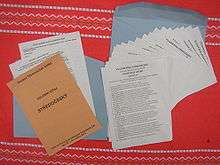
The Court viewed the Constitutional Act calling for one off early elections as an individual retroactive decision in violation of then-effective constitutional procedure regulating early election, and abolished the act on the basis of its violating the procedure for constitutional amendment, the right to vote, and the unalienable principle of a law-abiding state.[15] As the Court ruled the election date invalid, the laws (a constitutional amendment and a law shortening election deadlines) were passed on 11 September as planned.[16] President Klaus signed the laws on 12 September, and parliament planned to dissolve itself on 15 September.[17] Melčák stated, however, that he would likely file another complaint if this plan had gone ahead.[18]
In a surprise move, the Social Democrats announced on 15 September that it would not vote in favour of dissolution, as the new law was likely to be challenged by Melčák again and this would again call the legality of the election into question; they were now in favour of elections in mid-2010, on the initially scheduled date.[19] The Social Democrats had 71 seats and needed ten more MPs supporting their position to delay the election, but it was considered likely that they would succeed in blocking the election.[20][21] The Christian and Democratic Union (KDU-ČSL) also withdrew their support for early elections, meaning the election will be held in May 2010.[22]
Following controversial comments about the Catholic Church, Jews and gays, the Civic Democrat chairman Topolánek withdrew from the election and resigned as party leader on 26 March 2010.[23] He was replaced by Petr Nečas.[24]
Opinion polls
| Date | Polling Firm | ČSSD | ODS | TOP 09 | KSČM | VV | KDU-ČSL | SZ | SPOZ | Others |
|---|---|---|---|---|---|---|---|---|---|---|
| 7–12 May 2010 | PPM Factum | 26.3 | 22.9 | 10.9 | 13.1 | 12.6 | 5.5 | 2.5 | 2.6 | 3.6 |
| 3–10 May 2010 | CVVM | 30.5 | 19.0 | 14.0 | 13.0 | 11.5 | 3.5 | 4.5 | 2.0 | 2.0 |
| 28 April–4 May 2010 | Sanep | 29.9 | 22.3 | 10.1 | 12.9 | 9.8 | 4.7 | 2.8 | 5.5 | 2.0 |
| 23–28 April 2010 | PPM Factum | 27.5 | 21.7 | 11.1 | 13.9 | 11.0 | 5.2 | 2.9 | 3.2 | 3.5 |
| 13–28 April 2010 | Médea Research | 30.4 | 18.7 | 13.7 | 10.0 | 12.0 | 4.4 | 4.9 | 3.7 | 2.2 |
| 7–13 April 2010 | Sanep | 29.0 | 20.1 | 13.4 | 13.0 | 8.5 | 5.6 | 3.6 | 5.2 | 1.6 |
Campaign Finances
| Party | Money Spent |
|---|---|
| ODS | 213,000,000 Kč[25] |
| ČSSD | 184,124,000 Kč[25] |
| VV | 108,047,075 Kč[25] |
| SPO | 60,376,994 Kč[25] |
| TOP 09 | 53,628,000 Kč[25] |
| KDU-ČSL | 50,000,000 Kč[25] |
| SZ | 12,737,573 Kč[25] |
| KSČM | 10,200,000 Kč[25] |
| ČS | 7,000,000 Kč[25] |
| SSO | 1,100,000 Kč[25] |
| ČPS | 230,000 Kč[25] |
Results
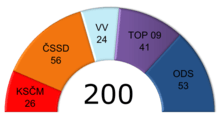
The centre-left Social Democrats won the most votes, with 22.1%.[3] The conservative Civic Democratic Party and TOP 09 followed with 20.2% and 16.7% respectively. The Communist Party came fourth with 11.3%, slightly ahead of the centre-right Public Affairs which received 10.9%.[26] It was the first time that the Communists had failed to finish third in a Czech election.[27] For TOP 09 and Public Affairs, it was the first election in which they had won seats in Parliament.[28] The Christian Democrats (4.4%), the Party of Civic Rights (4.3%) and the Green Party (2.4%), along with Sovereignty (3.7%), failed to gain the 5% necessary to enter parliament.[29][30] 62.6% of voters turned out.[31] The turnout was highest in Prague-West District (71.69%) and lowest in Sokolov District (50.89%). The results were a setback for the Czech Republic's largest parties, the Social Democrats and the Civic Democrats.[32] President Václav Klaus argued the results would cause a "fundamental weakening" of the two parties.[33]
| Party | Votes | % | seats | +/– |
|---|---|---|---|---|
| Czech Social Democratic Party | 1,155,267 | 22.08 | 56 | –18 |
| Civic Democratic Party | 1,057,792 | 20.22 | 53 | –28 |
| TOP 09 | 873,833 | 16.70 | 41 | New |
| Communist Party of Bohemia and Moravia | 589,765 | 11.27 | 26 | 0 |
| Public Affairs | 569,127 | 10.88 | 24 | New |
| Christian and Democratic Union – Czechoslovak People's Party | 229,717 | 4.39 | 0 | –13 |
| Party of Civic Rights – Zemanovci | 226,527 | 4.33 | 0 | New |
| Sovereignty – Jana Bobošíková Bloc | 192,145 | 3.67 | 0 | New |
| Green Party | 127,831 | 2.44 | 0 | –6 |
| Workers' Party of Social Justice | 59,888 | 1.14 | 0 | New |
| Czech Pirate Party | 42,323 | 0.80 | 0 | New |
| Party of Free Citizens | 38,897 | 0.74 | 0 | New |
| Right Bloc | 24,750 | 0.47 | 0 | 0 |
| Citizens.cz | 13,397 | 0.25 | 0 | New |
| Moravané | 11,914 | 0.22 | 0 | 0 |
| Conservative Party | 4,232 | 0.08 | 0 | New |
| Koruna česká | 4,024 | 0.07 | 0 | 0 |
| STOP | 3,155 | 0.06 | 0 | New |
| Coalition for Republic – Republican Party of Czechoslovakia | 1,993 | 0.03 | 0 | 0 |
| Czech National Socialist Party | 1,371 | 0.02 | 0 | 0 |
| Key Movement | 1,099 | 0.02 | 0 | New |
| Humanist Party | 552 | 0.01 | 0 | 0 |
| European Centre | 522 | 0.00 | 0 | New |
| Czech National Social Party | 295 | 0.00 | 0 | 0 |
| Liberálové.CZ | 260 | 0.00 | 0 | 0 |
| National Prosperity | 186 | 0.00 | 0 | New |
| Invalid/blank votes | 32,963 | – | – | – |
| Total | 5,230,859 | 100 | 200 | 0 |
| Registered voters/turnout | 8,415,892 | 62.60 | – | – |
| Source: Czech Statistical Office | ||||
By region
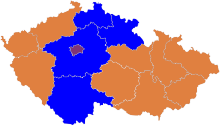
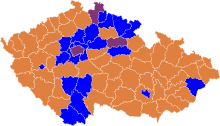
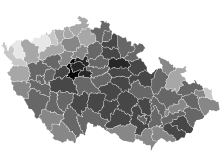
Prague
| Parties and coalitions | Votes | % | Seats | ||
|---|---|---|---|---|---|
| TOP 09 | 173,840 | 27.27 | 8 | ||
| Civic Democratic Party | 158,014 | 24.79 | 8 | ||
| Czech Social Democratic Party | 96,706 | 15.17 | 4 | ||
| Public Affairs | 65,742 | 10.31 | 3 | ||
| Communist Party of Bohemia and Moravia | 41,647 | 6,53 | 2 | ||
| Green Party | 30,528 | 4.78 | 0 | ||
| Party of Civic Rights – Zemanovci | 19,851 | 3.11 | 0 | ||
| Total (turnout 68.0%) | 637,328 | 25 | |||
Central Bohemian Region
| Parties and coalitions | Votes | % | Seats | ||
|---|---|---|---|---|---|
| Civic Democratic Party | 150,465 | 23.87 | 7 | ||
| Czech Social Democratic Party | 129,368 | 20.52 | 6 | ||
| TOP 09 | 110,865 | 17.59 | 5 | ||
| Communist Party of Bohemia and Moravia | 69,368 | 11.00 | 3 | ||
| Public Affairs | 67,601 | 10.72 | 3 | ||
| Sovereignty – Jana Bobošíková Bloc | 27,430 | 4.35 | 0 | ||
| Party of Civic Rights – Zemanovci | 23,235 | 3.68 | 0 | ||
| Total (turnout 64.26%) | 630,203 | 24 | |||
Aftermath
After the election results became known, Jiří Paroubek resigned as the Social Democrat leader citing disappointment with the outcome,[34] saying of the result "It seems that people have chosen the direction the republic should go in and it is a different direction than the one the Social Democrats were offering".[35] The Social Democrats had led comfortably in polling before the election, and its 22% share of the vote was a significant drop from the party's 32% in the 2006 election.[36] Paroubek conceded that a conservative coalition government was possible.[37] The Civic Democrats, TOP 09 and Public Affairs had each committed to government spending cuts, raising the prospect of the formation of a fiscally conservative Cabinet.[29] The leaders of the three parties held coalition talks shortly after the results were released.[38] Petr Nečas, the head of the Civic Democrats, claimed the three parties had a "common will" to join in government,[33][39] stating that their financial plans would work together to help the country avoid going into a similar crisis to the one Greece suffered at the same time.[35]
After extensive talks regarding the terms of the coalition,[35] Nečas was appointed PM on 28 June 2010.[40]
Footnotes
- ↑ Willoughby, Ian (5 February 2010). "Czechs to go to polls in general elections on last weekend of May". Radio Prague. Retrieved 7 February 2010.
- 1 2 "UPDATE 2-Czech leaders agree on cabinet, early election". Investing.com. Reuters. 5 April 2009.
- 1 2 Bilefsky, Dan (29 May 2010). "Left Wins Czech Vote, but Right Makes Gains". New York Times. Retrieved 29 May 2010.
- ↑ "Czech Republic voters move to right in general election". BBC News. 30 May 2010.
- ↑ "Czech MPs oust government in vote". BBC News. 24 March 2009.
- ↑ "Czech Party Leaders Agree To Early Polls In October". Radio Free Europe/Radio Liberty. Reuters. 28 March 2009.
- ↑
- ↑ "Support Eroding for Czech Social Democrats". Angus Reid Global Monitor. 31 August 2009. Archived from the original on 1 September 2009.
- ↑ "Czech president calls election for October 9–10". Reuters India. 1 July 2009.
- ↑ "Czech Constitutional Court postpones decree on early elections". ČeskéNoviny.cz. 1 September 2009.
- ↑ Carney, Sean (3 September 2009). "Czechs Try to Get Snap Election Back on Track". The Wall Street Journal. p. A4.
- ↑ Mlcochova, Jana (2 September 2009). "Czech leaders agree to secure quick election". Forbes. Reuters.
- ↑ "Czech lawmakers agree to amend Constitution". Aktuálně.cz. 9 September 2009.
- ↑ "Czech PM: Election likely in Nov, Oct possible". Reuters. 3 September 2009.
- ↑ "Dokument: Stručné zdůvodnění ÚS ke kauze volby". aktualne.cz (in Czech). 10 September 2009. Retrieved 27 September 2010.
- ↑ "Verfassungsreform in Prag im Eilzugstempo". Neue Zürcher Zeitung (in German). 12 September 2009.
- ↑ "Klaus signs both laws leading to Czech early elections". ČeskéNoviny.cz. ČTK. 12 September 2009.
- ↑ "Weg für Neuwahlen geebnet". derStandard.at (in German). 13 September 2009.
- ↑ "Czech Social Democrats say not to back early election move". World Bulletin. Reuters. 15 September 2009.
- ↑ "Czech Chamber to hardly dissolve itself without CSSD's support". ČeskéNoviny.cz. ČTK. 15 September 2009.
- ↑ "Czech Republic's snap November poll cast in doubt". Monsters and Critics. Deutsche Presse-Agentur. 15 September 2009.
- ↑ "Czech Republic's snap November poll likely scrapped (1st Lead)". Monsters and Critics. Deutsche Presse-Agentur. 15 September 2009.
- ↑ "Czech ex-premier Topolanek pulls out of election race". Earth Times. Deutsche Presse-Agentur. 25 March 2010. Retrieved 26 March 2010.
- ↑ "Necas replaces Topolanek as ODS election leader". ČeskéNoviny.cz. ČTK. 25 March 2010. Retrieved 26 March 2010.
- 1 2 3 4 5 6 7 8 9 10 11 televize, Česká. "VELKÝ PŘEHLED: Strany vyhazují za kampaně desítky milionů. Podívejte se do jejich účetnictví". Retrieved 14 August 2016.
- ↑ "Czech Vote Leaves Unclear Who Will Form Next Govt". National Public Radio. 30 May 2010. Retrieved 29 May 2010.
- ↑ Carney, Sean (29 May 2010). "Czech Election May Produce Center-Right Coalition, Sidelines Communists". Wall Street Journal. Retrieved 29 May 2010.
- ↑ Laca, Peter; Chamonikolas, Krystof (29 May 2010). "Czech Voters Choose Spending Cuts Amid European Debt Crisis". Bloomberg. Retrieved 29 May 2010.
- 1 2 Laca, Peter (29 May 2010). "Early Czech Votes Show Anti-Deficit Cabinet Possible (Update1)". Bloomberg. Retrieved 29 May 2010.
- ↑ Total voting results, Czech Statistical Office. Retrieved 29 May 2010.
- ↑ Janicek, Karel (29 May 2010). "Czech vote leaves unclear who will form next govt". Associated Press. Retrieved 29 May 2010.
- ↑ Flemr, Jan (30 May 2010). "Small Czech parties trigger political 'earthquake'". AFP. Retrieved 30 May 2010.
- 1 2 "Czech centre-right coalition likely". Al-Jazeera. 30 May 2010. Retrieved 30 May 2010.
- ↑ "Czech SocDem leader quits after poor election result". Reuters. 29 May 2010. Retrieved 29 May 2010.
- 1 2 3 "Czech Republic voters move to right in general election". BBC News. 30 May 2010. Retrieved 31 May 2010.
- ↑ "Stage set for Czech coalition government". CNN. 30 May 2010. Retrieved 30 May 2010.
- ↑ "Czech SocDem leader sees right-wing coalition". Reuters. 29 May 2010. Retrieved 29 May 2010.
- ↑ "Czechs Choose Budget Cuts Amid European Debt Crisis (Update1)". Bloomberg. 30 May 2010. Retrieved 30 May 2010.
- ↑ "ODS navrhuje na Premiéra Nečase kongres svolá za tři týdny (in Czech)". Novinky.cz. 30 May 2010. Retrieved 31 May 2010.
- ↑ Kopecký, Josef (28 June 2010). "Klaus jmenoval Nečase premiérem. Země má teď dočasně hned dva". iDnes (in Czech). Retrieved 28 June 2010.
External links
| Wikimedia Commons has media related to Czech legislative election (2010). |
- Official election website of the Czech Statistical Office
- NSD: European Election Database – Czech Republic publishes regional level election data (NUTS 1–3); allows for comparisons of election results, 1990–2010
